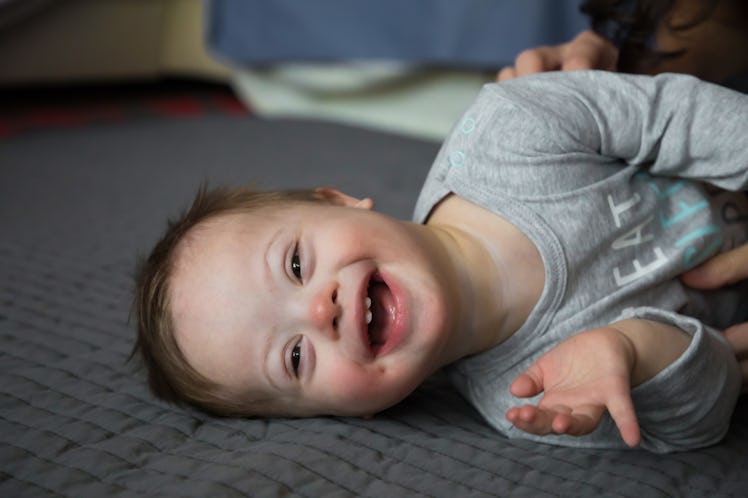When Do Babies Start Laughing And Mean It?
It has nothing to do with the quality of your jokes.

There are a few chief concerns that most new parents share: Why isn’t the baby sleeping, what’s the best way to get them to stop crying, and at what point should a pediatrician be called? These concerns are generally temporary, but once they’re addressed, new worries take over. Just as baby is sleeping peacefully every once in a while parents are introduced to the world of developmental milestones, and start to wonder: Should my baby have started smiling by now? When do babies start laughing, anyway?
The first thing parents need to understand is that every baby is different. Although developmental milestones exist as a general guide, they arrive according to a child’s own pace. Babies usually start laughing “between 2-4 months” says Nina Pegram, pediatric nurse practitioner and lactation consultant with SimpliFed. Before this, an intentional smile would most likely have occurred between 1-2 months; sometimes in their sleep, she adds. But the absence of laughter, at this particular age, does not mean that there is something wrong with a child. Some babies simply tend to be more stern.
What Does It Mean When Babies Laugh?
“The first few smiles are normally caused by an involuntary reflex,” says Carolyn, a registered nurse and Parenting Consultant at Teach Work Mom. During the REM phase of sleep, your baby may smile, jerk, laugh, or cry. Laughing or smiling at this early stage is not an emotional response, but a natural way of practicing expressive skills. The baby will not begin to smile or giggle with intention until around the second month. “Smiling and laughing shows that your baby’s brain and vision has matured to the point that they can recognize your face and display emotions voluntarily.”
How Do I Make My Baby Laugh for the First Time?
Parents can choose between two avenues to make their baby laugh. The first requires letting go of inhibition and just being silly. Playful voice changes, funny noises, using facial expressions one might expect from a mime or clown. Don’t worry. Babies don’t have the manual dexterity to hit the record button on a cell phone and all of this will fade from their memory before they can talk. So ham it up.
The second option is to elicit laughs through playful and loving touches. Kisses to the hands and feet tend to work well. And so does lightly blowing air across a baby’s skin, or brushing them with light touches.
Just keep in mind that it’s easy to startle or overstimulate a baby. They are still working on processing all of the sensory information that surrounds them. It’s a fine line between playful startling and straight-up scary. And if they start to get agitated from too much physical contact, give them an opportunity to wind down before they get too upset.
Should Parents be Concerned About Their Child’s Development?
“Some babies are more serious than others so it is ok if your baby is not laughing by 3-4 months old” adds Carolyn. There isn’t any cause for concern until about 6 months. At this point if your baby is not making eye contact, smiling or laughing at all, you might want to discuss it with your pediatrician. As a parent, you can encourage your baby to laugh by talking to them frequently, singing or making animated faces.
How to Stimulate Laughter in Your Child
- Remember to be talking to your baby A LOT!
- Be animated, let them see your face well, how you enunciate, how you speak, how you emote.
- Babies love to watch faces, expressions, hear words and songs so get right in there with them!
The crux of the issue is that babies can start laughing as early as 2 months old. They will continue to laugh more frequently and with purpose throughout their first year. Every child develops at their own pace, but any worries should be directed to a pediatrician.
This article was originally published on